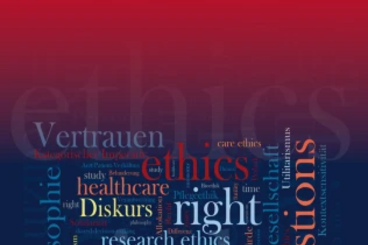
26.09.2025
Volume 37, Issue 3, Ethik in der Medizin - Just out: Special issue on "Ethical Issues in Genomic Newborn Screening" in the journal "Ethik in der Medizin," the official journal of the AEM (German Academy for Ethics in Medicine)
Research project funded by the German Federal Ministry of Education, Technology and Space (BMFTR; 01GP2201A/B)

26.09.2025
Volume 37, Issue 3, Ethik in der Medizin - Just out: Special issue on "Ethical Issues in Genomic Newborn Screening" in the journal "Ethik in der Medizin," the official journal of the AEM (German Academy for Ethics in Medicine)
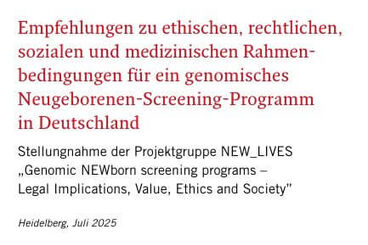
17.09.2025
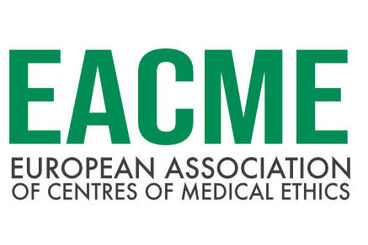
17.09.2025
Following the symposium in July in Heidelberg, we presented the ethical evaluations and selected recommendations of the project also to an international audience at two conferences: EACME 2025 (Zurich) and ESPMH 2025 (Manchester). The talk will also be given at this years annual conference of the German Academy of Ethics in Medicine (AEM) at the beginning of October in Munich.
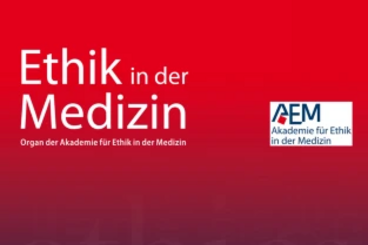
05.09.2025
Our new two-part article on genomic newborn screening has just been published in the journal Ethik in der Medizin: Part I: mapping the ethical issues (published online first: September 02, 2025); Part II: outlining a normative framework (online first: September 05, 2025)
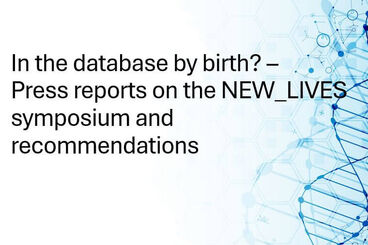
06.08.2025
Following the symposium to present an ethical, legal, societal and medical framework for a possible future genomic newborn screening program (July 18, 2025, Heidelberg, Marsilius-Kolleg), the project results were reported in the press. We have compiled a selection of the press coverage for you here, in which members of the project group (including Prof. Eva Winkler, and Karla Alex, Ethics; Prof. Ralf Müller-Terpitz, Law; Prof. Ulrike Mütze, Paediatrics; Prof. Christian Schaaf, and Dr Nicola Dikow, Genetics), also have their say.

18.07.2025
On July 18, 2025, the NEW_LIVES project group held an international symposium at Heidelberg University, where ethical, legal, medical, and social framework conditions for a possible genomic newborn screening program were presented.
Since the late 1960s, virtually all newborns in Germany have been standardly tested for a number of rare but severe diseases, since a timely diagnosis and treatment of these diseases significantly improves their prognosis. Thousands of young patients have profited from Germany’s newborn screening program. In part, its success is also due to the program’s continued development, which led to the inclusion of further target diseases and new methods of analysis. The maturation of new genomic technologies now offers the opportunity to expand newborn screening once again and in particularly significant ways. At the same time, such an expansion would come with considerable medical, ethical, legal, and social challenges.
Is genomic newborn screening (gNBS) a reasonable option for Germany? How can we realize the significant health benefits offered by the new technologies and at the same time minimize potential risks for everyone involved? Our interdisciplinary research group “NEW_LIVES: Genomic NEWborn Screening Programs – Legal Implications, Value, Ethics and Society” aims to address these questions. Generously funded by the German Federal Ministry of Research, Technology and Space, NEW_LIVES joins researchers from five different disciplines at Heidelberg University Hospital, the Heidelberg University Faculty of Medicine, and the University of Mannheim and is carried out in close consultation with representatives of patient organizations.
On this website, we would like to inform you about the opportunities and challenges of a potential genomic newborn screening program and the research conducted in our five subprojects.

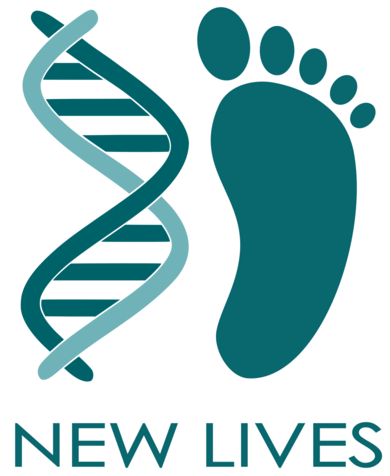
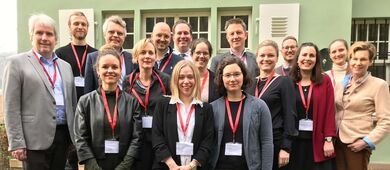
NEW_LIVES Project Group at the conference “Towards Genomic Newborn Screening in Germany” in March 2024 at the Internationales Wissenschaftsforum Heidelberg (IWH). Picture: Martin Jungkunz.
